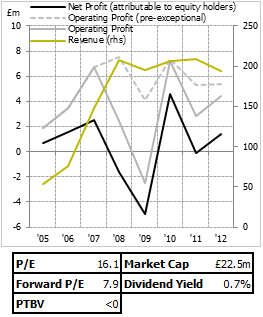 Empresaria (LON:EMR) released their full-year preliminary results on Tuesday, and alongside a recommendation, I figured I'd give them a glance over. They're a staffing group I've looked at before - along with Impellam, Morson and Matchtech. All of these stocks (bar the heart-breakingly delisted Morson) have been on a pretty steep run since the start of this year - hasn't everything - but Empresaria still looks relatively interesting from an earnings/cashflow point of view. I try my best not to let price rises deter me from looking at shares; value is always against the current price, not where it traded at 3 months ago, and giving in to the pang of regret that you missed it then is a bad path to start on!
Empresaria (LON:EMR) released their full-year preliminary results on Tuesday, and alongside a recommendation, I figured I'd give them a glance over. They're a staffing group I've looked at before - along with Impellam, Morson and Matchtech. All of these stocks (bar the heart-breakingly delisted Morson) have been on a pretty steep run since the start of this year - hasn't everything - but Empresaria still looks relatively interesting from an earnings/cashflow point of view. I try my best not to let price rises deter me from looking at shares; value is always against the current price, not where it traded at 3 months ago, and giving in to the pang of regret that you missed it then is a bad path to start on!
By way of a quick blitz through the business, 90% of their income comes from recruitment services. This is what you'd typically expect of a company like this, with a two-third/one-third split between temporary and permanent recruitment respectively. The other 10% of their revenue comes from training and outsourcing. The group portfolio contains 20 different brands in 18 countries, with a fairly even split of revenues between the UK, Continental Europe and the Rest of the World, and a fairly diversified cross-section of sectors, too - industrial occupies about a third, a sizable chunk, but the rest comes from finance, healthcare, construction, IT, retail and other professional services. Clearly, this is already a different approach to Morson and Matctech, the other two recruiters I'm most familiar with. They specialised in technical recruitment. I'm ambivalent on which approach is better - while there are probably advantages to being niche and focused, I wonder how many scale economics really exist beyond a certain point in recruitment, and diversification has the clear advantage of making group revenues more resilient to shocks in any specific sector. One to ponder.
The business model
One thing that is immediately appealing about the company is how much they make of their buy-and-build business model. In recruitment, I suspect it's quite a good way of doing things; the group has a number of minority stakes in companies, which come about when they purchase a business but leave management with a part of the equity of that business. It just seems logical; incentivising the people who created the business, who…

.png)



